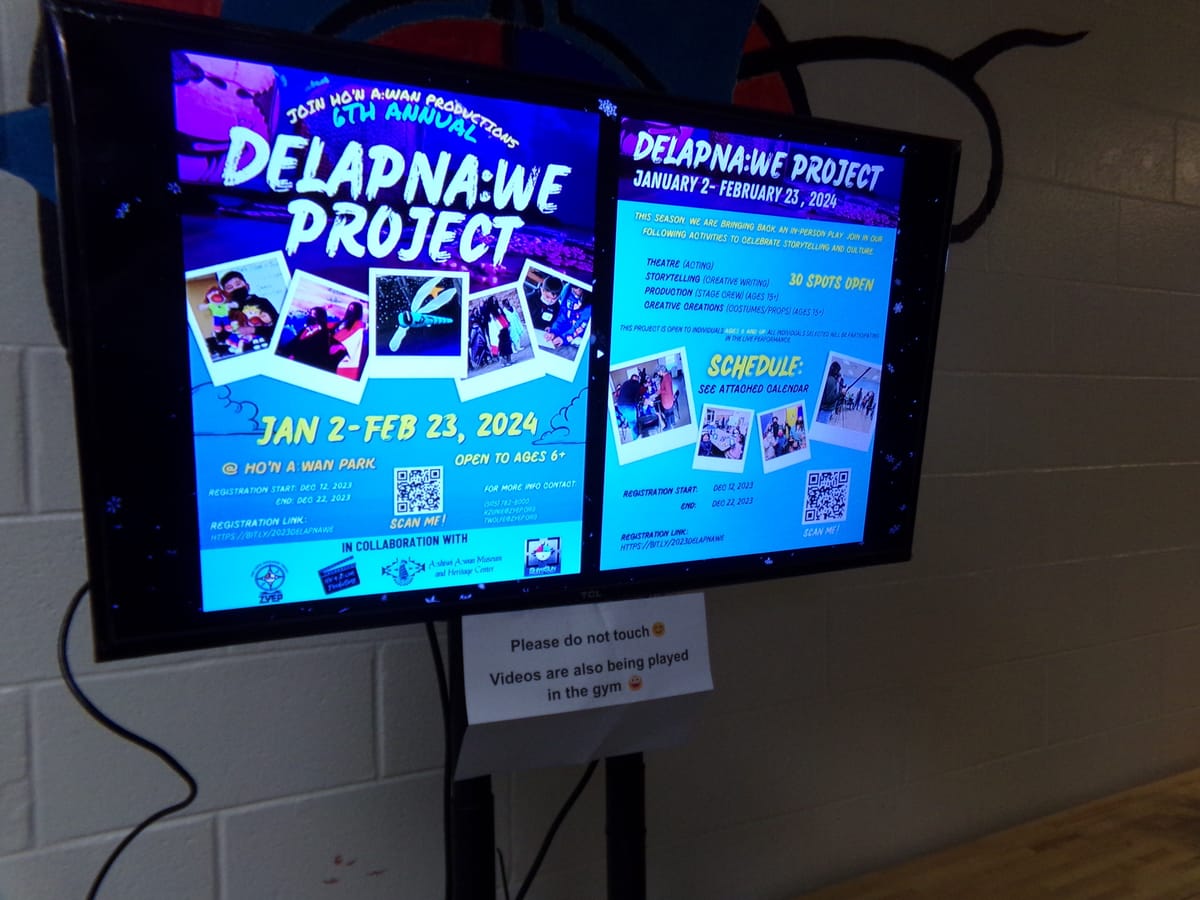Delapna:we (Zuni Storytelling)

Today the 6th Annual Winter Storytelling production by Zuni Youth Enrichment Project hosted a live performance at the Zuni Educational & Cultural Resource Center in Zuni Pueblo. February 16th & 18th were the designated days for two live performances. Stories featuring Suski an Delapna:we (Coyote Stories) were acted out by a cast of youth and community members telling the story of Coyote & The Birds followed by a second act of Silo, Debi, and The Hungry Suski. The term Suski is Zuni and refers to Coyote. Delapna:we is the term for storytelling, a winter activity. The cast and crew had started meeting in October of this past year creating hand-sewn costumes, script, & background scenes.
Curtis Quam, A:Shiwi Awon Museum & Heritage Center Director & Cultural Advisor, was on hand to brief the audience on the history of the goals for the project. The importance of creating community & family conversations acting on language preservation. Current statistics indicate our language is “threatened” and headed towards the “endangered” category. The Zuni (Shiwima Bena:we) dialect is an isolate language. This means no other group of people in the world speaks Zuni.
During the year 1994 a Zuni tribal member named Edmund Ladd reported that the main language spoken in the homes of the pueblo was Zuni. Data from 2015-2019 obtained from the United States Census Bureau stated 83.8% on the Zuni Reservation spoke a language other than English. Following up in 2018 a publication from the Zuni Head Start indicated 18% of students understood Zuni language. There is the notion which indicates the number could be lower than reported. “Many linguists estimate that half to 90% of the World’s Indigenous languages will be moribund by the end of the century.”
Zuni Youth Enrichment Program Director Talia Natachu stated, “...this production is a vital piece of engagement for the community and the family. We thank you for supporting your youth!” For 6 years a commitment has been fostered by youth and families who have gained confidence in public productions which includes speaking their native tongue. The cast members spoke their lines in Zuni along with the adaptation in English as needed.
Another goal is to make the community aware it will take multi-generational connections to keep our culture going. Families are the first teachers. It is the hope that dialogue will be created within families for meaningful discussions about our roles as A:Shiwi (Zuni people) so our identity is strong in our collective roles.
A timeline of partnerships starting with Doris Duke in 1966 Oral History Project started recording interviews, stories, along with personal experiences of Zuni elders. There were a total of nineteen elders who were recorded and archived. This was followed by University of New Mexico Press and The National Library of Congress who helped to store the collection and digitized the collection which is now being translated. The feature storyteller for Suski an Delapnawe is acknowledged as Acque, known in Shiwima as E:kuwaye. In 2004 Arden Kucate started the work for the digitized audio to be returned back to the Zuni people. Many people have been involved in helping to keep the work and the language alive.
Today we were taught about the art of Storytelling, which is a winter activity. Storytelling is done when the snakes are gathered and still in the ground. It is an art which requires no money. Money is considered foreign in this process. Examples for a payment to a storyteller could be a food bundle or a scarf or both. In the production, Storyteller Willard Sanchez, gives points on etiquette.
Most times, the story being told will be long and could last for a spell, even hours. During this time, our ancestors are present. There is no laying down and stretching out. Those in the circle for storytelling are expected to sit upright and no one is allowed to sleep. For those who dare, storytellers were known to have small pebbles to toss at you to wake you up! Others were sure to carry a stick to poke you awake if you should doze off.
Storyteller Sanchez states as an audience, engagement is necessary. As he indicated the beginning of a story the audience responds, “E:so (believed to translate to So be it, [said] Kirby Gchachu, Educator). We respond when indicated. At the end of the story, all community members present are instructed to stretch their arms high towards the sky calling out, “Ho le:semdashadu”...asking for growth. If you don’t…you might risk becoming hunchbacked. Everyone there stretches and reaches the sky. Today was a good day.
Lastly, the organization gives thanks to the leadership of Zuni for supporting the efforts of ZYEP.
To all the cast and crew, your Heartwork was highly entertaining as well as educational…Elahkwa (Thank you)! A special thanks was given to the following partners:
The late Acque, featured Storyteller
ZYEP Donors & Families
Substance Abuse and Mental Health Services Administration
NM Behavioral Health Services Division
Library of Congress
Doris Duke Foundation
Zuni Public School District (Shiwi Ts’ana Elementary)
Zuni Cultural Educational & Cultural Resource Center
Zuni Public Library
Zuni Archives
KSHI 90.9 FM Zuni Radio
Shiwi Sun Productions
Edaakie Art
A:shiwi Awon Museum and Heritage Center
&
To Shelley Morningsong & Fabian Fontenelle (Community Leaders & Educators)
Zuni Youth Enrichment Program is a Zuni led organization working to enhance the lives of Zuni youth. To find out more information about ZYEP click on the link to get connected. Make a donation to help fund more community engagements for inclusion and community building on their site: https://www.zyep.org/





